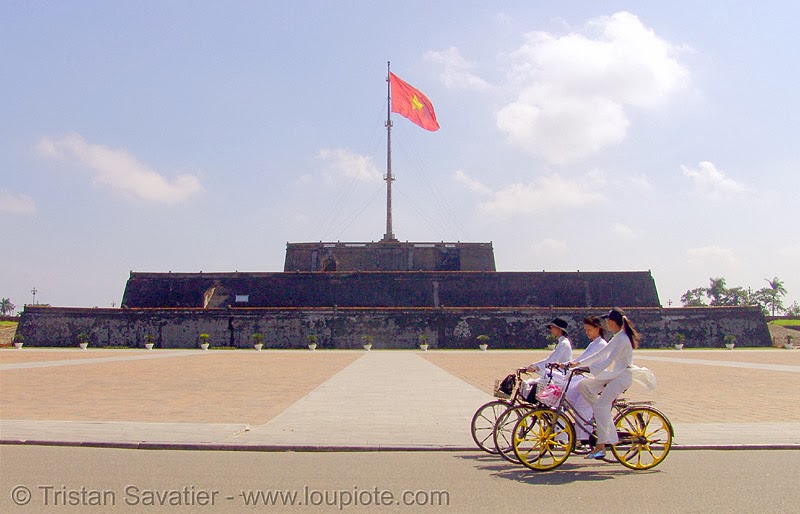Hue is located in central Vietnam. Complex of Hue Monuments lies
along the Perfume River in Hue City . The main enceinte, the Capital
City, is square in plan, each side measuring 2,235 m. The Imperial City
is surrounded by 4 walls with about 600m long each and 4 gates, one of
which is Ngo Mon (Noon Gate), considered the symbol of the Citadel.
That
architectural system consists of Kinh Thanh (Capital Citadel), Hoang
Thanh (Royal Citadel) and Tu Cam Thanh (Forbidden Citadel). Hoang Thanh
wasbuilt in 1804 but until the reign of Minh Mang it wasfinished with
more than 100 projects: Therefore, when talking about Hue, people often
mention and think of the golden palace, the splendid temples,
magnificent tombs, or poetic natural landscapes, etc.
For
approximately 400 years, Hue has become a great landscape and
architectural site. Thanks to the long precious history, Hue has
integrated material and spiritual values, which become its own unique
special culture. Hue royal complex has been officially recognized by the
UNESCO as a World Heritage Site. Once again, in 2003 Nha Nhac,
Vietnames Court Music was recognized as World Heritage by UNESCO.
Should you ever come inside the citadel, taking a look into the special feudal relics of immense architectural and cultural values, you will surely more or less love the traditional and classical side of Vietnam.
Image credits: flickr.com
 |
| Hue Imperial City (The Citadel) |
 |
| Thai Hoa Palace |
 |
| Noon Gate (Ngo Mon) |

 |
| Corner Detail of the Ngo Mon Gate |

 |
| Thai Hoa Palace |
 |
| Corridor - Imperial Enclosure |
 |
| The lotus lake in Tu Duc Tomb |
 |
| The Old Citadel of Hue |

 |
| Forbidden Purple |
 |
| Hue Citadel Gazebo - This gazebo like structure is right behind the Thai Hoa palace |
 |
| Minh Mang Tomb |
 |
| A Grand Archway |

 |
| Tu Duc Tomb |
If you like something mysterious and valuably architectural,
you should take a visit to the tombs of ancient Kings. Situated in the middle
of the hills on the Southern bank of Perfume
River are very beautiful
tombs of Nguyen Kings. Among these tombs are the four famous ones with the name
and the arrangements of the tomb reflected each Emperor's points of view,
personality and tastes.This is majestic Gia Long tomb, imposing Minh Mang tomb,
poetic Tu Duc tomb and magnificent Khai Dinh tomb.
 |
| Face of Guardian of Tomb of Khai Dinh in Hue |
 |
| Emperor Khai Dinh Tomb, Hue Vietnam |
 |
| Thiên Mụ Pagoda |

 |
| Drying cored stick incense |
 |
| Girls on bicycles - Cot Co Flag Tower |

 |
| Hue city A little sailing on a fine day |
 |
| With the blue water, Huong riverwinding immense moutains,
overacross Hue
citadel making a chamingscene |
 |
| Buildings and their reflection along the Perfume river at sunrise in the suburbs of Hue, Vietnam |
 |
| Lang
Co Beach is one of the mostplace beauty scene and best naturalcondition with
blue water and the vasttropical forests |
 |
| Lang Co Beach |
 |
| Lap An lagoon |
 |
| Lăng Cô Village Huế |
 |
| Thanh Toan tile-roofed bridge |
 |
| Hue by night. |
+of+the+Imperial+Hotel.jpg) |
| Picture taken from the terrasse (King’s Panorama Bar) of the Imperial Hotel |
 |
| Trang Tien Bridge |
 |
| Trang Tien Bridge over Huong river |
 |
| National high school (Trường Quốc Học Huế) - École primaire supérieur |
Besides all these, Hue’s culture is also found in its famous “non la” or conical hats. You can meet a long-haired Hue’s Vietnamese girl in the traditional long dress (Áo dài) and a graceful conical hat.

 |
| Vietnamese girls wearing conical hats |












































+of+the+Imperial+Hotel.jpg)
















+Imperial+City+-+Hue.jpg)












I have been to Hue and was really impressed with its monuments.
ReplyDelete